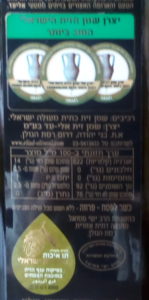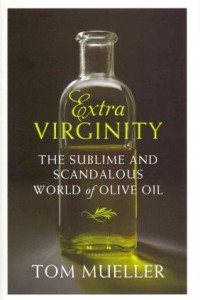What You Need to Know Before Buying Your Next Bottle of Olive Oil

Olive Oil Fraud, Health, and Kashrut Concerns

Turkey
Just as harvesting quality grapes and producing wine is a complex operation, so too is the harvesting of olives and production of good quality olive oil to ensure that the oil tastes good and contains optimal nutritional components. Unfortunately the olive oil industry is fraught with deception and fraud. Often times soy oil or nut oils are substituted for olive oil with coloring and a small amount of olive oil added for taste, or low quality olive oil is deodorized and mixed with a bit of extra virgin olive oil for taste. Even thousands of years ago, olive oil fraud was a problem! In fact, the Romans clearly labeled each bottle of olive oil, noting the quality of the oil and origin and sealing, it as a guarantee of authenticity and quality when it reached its destination.
The Israeli Health Ministry repeatedly warns about problems in Israel with companies selling sub-par olive oil or substituting with seed oils and selling them as olive oil. See their latest one here. The Israeli Rabbinate has issued notices about fraudulent kosher certification on olive oils as recently as last year.
Rabbi Yirmiyohu Kaganoff, of Yeshiva Beit El, wrote a very interesting article entitled Olive Oil Concerns in which he reviews the use of olive oil in the Beit Hamikdash, methods of pressing the olives, health benefits of olive oil, and concerns about olive oil adulteration not only today, but also as discussed in the Gemara and by the Rama over a thousand years later. In his article, Rabbi Kaganoff discusses the important differences in standards that kashrut agencies employ today to guard against the possibility of olive oil adulteration. And he very astutely concludes that “this information is highly useful not only from a kashrus perspective, but also from the perspective of someone purchasing extra virgin or virgin olive oil who wants a guarantee that they are getting the health benefits they are paying for.”
What to Look for When Buying Olive Oil
You do not have to remain at the mercy of the bottlers; if you know what to look for when purchasing olive oil you can be pretty sure that what you are getting is the real thing. If you would like to become a real olive oil aficionado, you can learn to sip different olive oils to detect their qualities in a manner very similarly to how one tastes wine. Since this is not practical for most of us, here is what to look for
In the store:
- Oil should come in dark glass bottles to protect against light.
- Don’t worry about color. Good oils come in all shades, from green to gold to pale straw.
- Buy oil labelled “extra virgin” (in Israel look for שמן זית כתית מעולה – shemen zayit katit meula), since other categories have undergone chemical refinement, lost many of their health benefits, and may contain traces of chemicals and other contaminants.
- If you see olive oil labeled as “pomace oil” steer clear of it. It is basically (to put it bluntly) re-purposed waste from the olive oil refining process. It may sound fancy, but it is not.
- The acidity (חוּמצִיוּת – chumtziut) content on the label is also an indication of quality – the lower the better. Anything over 0.8% is lacking in quality; however, even that percentage is considered too high. In Israel olive oils that have acidity greater than 0.8% are considered virgin, not extra virgin.
- Try to buy oils only from this year’s harvest – look for bottles with a date of harvest. Otherwise, look at the “best by” date which should be not more than two years after an oil was bottled (but even that may be too long since there is no way of knowing how long the oil sat till it was bottled).
- Buy a quantity that you’ll use up quickly.
At home:
- The flavor and aroma of extra virgin oils have a marked fruitiness reminiscent of fresh olives and some level of bitterness and pepperiness. Good quality oil will have a pleasant taste and clean sensation and you should feel a “burn” at the back of your throat when you’ve swallowed the oil plain (neat).
- If you put some olive oil on your skin and the smell does not go away after a few minutes then it is not olive oil.
- Contrary to popular belief, putting the oil in the refrigerator to see if it hardens is not an indication of whether or not it is truly olive oil. Read why here.
Tom Mueller, in his book Extra Virginity: The Sublime and Scandalous World of Olive Oil (both an entertaining and eye-opening read) explains that
… the oil’s healthful properties are directly proportional to the strength of its flavors, aromas, and other sensory characteristics. If an oil doesn’t sting at the back of the throat, it contains little or no oleocanthal (an anti-inflammatory). If it isn’t bitter, it’s low in tocopherol (vitamin E – which would also help prevent the bottled oil from oxidizing) and squalene. If it isn’t velvety in texture then it’s missing hydroxtyrosol.
(p104)

Quality olive oil is not inexpensive, but you are buying a product with significant health benefits that has been carefully harvested and processed.
The Israeli consumer can find many award-winning Israeli olive oils (not necessarily organic) that are reasonably priced. Oils that have received an award from the TERRAOLIVO International Extra Virgin Olive Oil Competition have a round seal with a pitcher on the label with the year awarded or multiple seals if they’ve won in more than one year.
Many Israeli olive oils also have a a Seal of Quality (תו איכות – tav aychut) from the Israel Olive Board, shaped as an oil droplet, which includes a unique number on the bottom.
The quality mark for Israeli olive oil is a voluntary quality standard, the rules of which are accepted by the participants. The label is a registered trademark and is subject to the Israeli standard for olive oil… and today it is used by more than 100 growers and manufacturers.
(Translated from the Hebrew.)

Previously, the defunct Israel Olive Council provided a similar certification. Their stickers, like the one to the left, if found on bottles of olive oil today, are fraudulent.
A major concern when buying uncertified Israeli olive oil is that it may contain mostly foreign oil. As explained in this HaAretz article, Israeli companies are allowed to market their olive oil as Israeli if at least 35% of the production costs originate in Israel. This means that olive oil bottled and sold as Israeli olive oil can really be mostly foreign oil. Legal fraud or just misleading? Olive oils bearing the Certificate of Quality must be 100% Israeli oil from a certified grower or distributor.
It pays to bear in mind, however, that there are many excellent Israeli olive oils that do not have this voluntary seal. If you are interested in using one without a quality or award seal, then it’s best to peruse their website or call them up for information, in order to determine the integrity of their products. And while you may also find excellent olive oils imported from other countries, unlike wine that improves with age, olive oil starts degrading after it’s produced. Therefore, quality oil produced and bottled in your own country will most likely be fresher and retain more of its health/nutritional components than oil that sat in a tanker as it made its way from foreign shores.
One caveat: Olive oil should not be the only oil or fat used since we also need the nutrients found exclusively in animal fats; too much monounsaturated fat without a balance of saturated fats can cause health problems.
No-Mayo Coleslaw with Olive Oil
Try out this great recipe for coleslaw prepared by food blogger Marc Matsumoto who explains why he prefers his coleslaw without mayo:
I’m not a big fan of traditional coleslaw. Call me crazy, but I really don’t get the appeal of raw cabbage swimming in mayonnaise soup. That’s why I make my coleslaw without mayonnaise.
Instead, I use lemon juice, a little honey and generous dose of olive oil. The latter two ingredients add depth, while smoothing out some of the sharp edges of the lemon juice. Not only is it healthier, it makes for a light, citrusy contrast to the foods of summer, be it an unctuous rack of barbecued ribs, or a greasy leg of fried chicken.
My suggestions: You can substitute white wine vinegar or fresh lime juice for the lemon juice, if you prefer. I buy organic limes when in season, squeeze the juice, freeze in an ice-cube tray, and then store in a baggy. If using vinegar I would recommend adjusting the proportions to start, so that you have about 1/4 the amount of vinegar as oil. Not only is this healthier than using mayo made from GMO soy oil, it tastes great, and you avoid the risk of spoilage that coleslaw with mayonnaise has. You can also use this as a starting point and get creative. We enjoy it so much that it actually disappears very quickly.
Ingredients
- 1/4 small red cabbage
- 1/2 small green cabbage
- 1/2 carrot, shredded
- zest of 1/2 lemon
- 1/4 cup lemon juice
- 1/4 cup olive oil
- 1 tablespoon honey
- 1 teaspoon salt
- 1/4 teaspoon black pepper
Directions
- Remove any tough outer leaves from the cabbage.
- Trim the core and any tough stems from the cabbage and thinly slice.
- Add to a bowl with the shredded carrot, lemon zest, lemon juice, olive oil, honey, salt and black pepper. Toss to combine.
- Serve this right away for more of a salad, or store it in the fridge overnight for a slaw that’s more pickled.
Yield: 6-8 servings
Garlic Oil
I would also like to thank our dear friends Shoshana and Scott for introducing us to Garlic Oil at their Shabbos table. Since then we have been enjoying olive oil with chopped garlic in it on our challah. Very often it’s actually olive oil in our chopped garlic! (Of course, it’s enjoyable during the week, too.) Much better and healthier than the garlic bread I used to make or buy (many years ago) with powdered garlic.
To your health!
Choosing Healthy Fats and Oils
Coconut Oil is Good for Health
Resources and additional information:
Extra Virginity: The Sublime and Scandalous World of Olive Oil
by Tom Mueller
How to Buy Great Olive Oil
Olive Oil Times
The World’s Best Olive Oils 2017: The winners of the New York International Olive Oil Competition

0 Comments on “What You Need to Know Before Buying Your Next Bottle of Olive Oil”